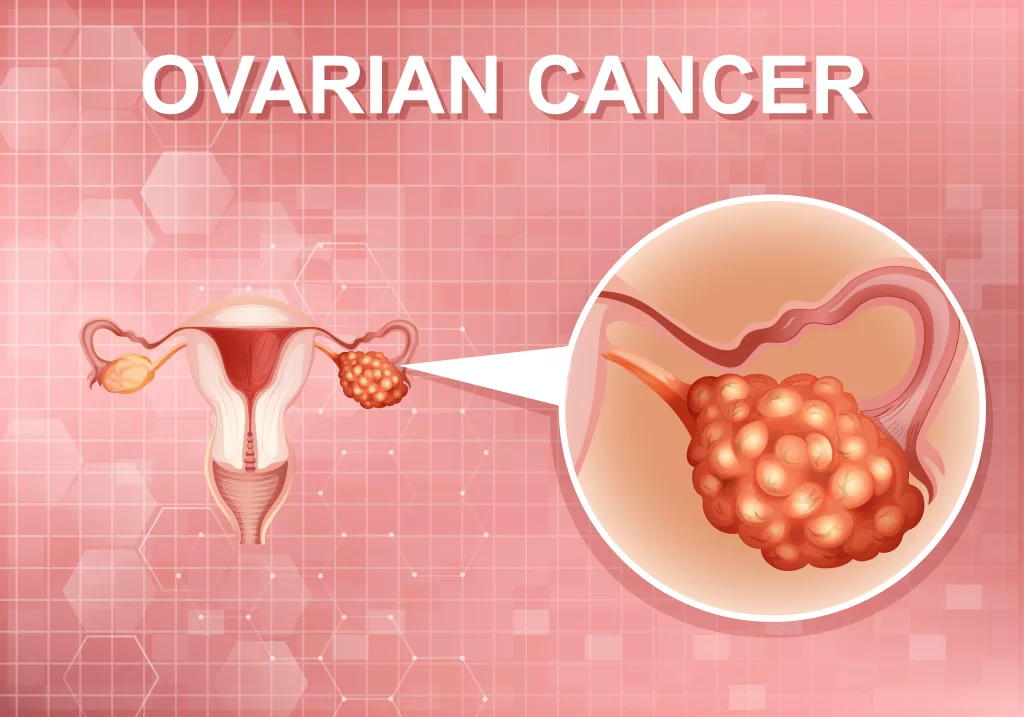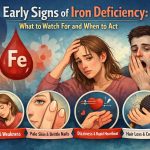Ovarian cancer, though not as common as some other types, is a serious disease that affects women’s reproductive health.
Detecting the signs and symptoms of ovarian cancer early and getting prompt treatment is crucial for better chances of survival.
Let’s dive into what ovarian cancer is, its risk factors, and the important signs to be aware of.
Read: Learn more about ovarian cancer.
Table of Contents

Understanding Ovarian Cancer
Ovarian cancer starts in the ovaries, which are part of the female reproductive system. They make eggs and hormones like estrogen and progesterone.
The disease often goes unnoticed until it’s advanced, so catching it early is crucial for effective treatment.
Risk Factors of Ovarian Cancer
While we’re not exactly sure why ovarian cancer happens, some factors increase the risk:
- Age: Women over 50, especially those over 65, are at a higher risk.
- Family History: If your family has a history of ovarian, breast, or colorectal cancer, your risk is higher.
- Inherited Mutations: Gene mutations like BRCA1 and BRCA2 increase the risk.
- Personal History: Having had breast, uterine, or colorectal cancer slightly raises the risk.
- Endometriosis: When tissue lining the uterus grows outside it.
- Obesity: Being overweight may contribute to a higher risk.
Early Signs and Symptoms of Ovarian Cancer
Knowing the signs can improve your chances of early detection and successful treatment.
Read: Recognizing ovarian cancer symptoms
However, remember these symptoms can be vague and confused with other less serious conditions. If any persist for weeks and aren’t typical for you, consult a healthcare professional:
Abdominal Discomfort
One of the early signs of ovarian cancer is persistent pain, cramping, or pressure in the lower abdomen or pelvis. Unlike menstrual cramps or digestive discomfort, this pain does not subside over time and may worsen gradually. It can range from a dull ache to sharp pain, sometimes spreading to the lower back or thighs.
Bloating
Unexplained bloating that does not improve with dietary changes is another common sign of ovarian cancer. This bloating is often persistent, causing a tight or swollen feeling in the abdomen. Unlike occasional bloating caused by certain foods, ovarian cancer-related bloating lasts for weeks and does not respond to simple remedies like drinking more water or reducing salt intake.
Urinary Changes
Frequent urination or a sudden urge to go, even without increased fluid intake, can be an overlooked sign of ovarian cancer. Some women also experience difficulty emptying their bladder fully. These symptoms may mimic a urinary tract infection (UTI) but persist despite treatment. If urinary changes appear without an obvious cause, they should be discussed with a doctor.
Changes in Digestion
Digestive issues such as persistent indigestion, nausea, constipation, or diarrhea can also be early signs of ovarian cancer. These symptoms may develop when tumors press against the stomach or intestines, leading to discomfort and irregular bowel movements. Some women report feeling gassy, experiencing heartburn, or noticing unexplained weight fluctuations.
Appetite Loss or Feeling Full Quickly
Feeling full after eating only a small amount of food (early satiety) or a sudden loss of appetite could be a sign of ovarian cancer. Tumors can put pressure on the stomach, reducing the ability to eat normal portions. Over time, this can lead to unintended weight loss and nutritional deficiencies.
Fatigue
Chronic, unexplained fatigue that does not improve with rest can be one of the more subtle signs of ovarian cancer. Unlike normal tiredness, this fatigue can feel overwhelming and make daily activities difficult. The body may also feel weaker due to energy depletion from cancerous growth.
When To Seek Medical Attention
If you experience these symptoms often or notice a persistent unusual change in your body, consult a healthcare professional. While not necessarily ovarian cancer, they could indicate other health issues.
Read: When to see a doctor for ovarian cancer symptoms
Conclusion
Ovarian cancer is serious, but early detection can make a big difference. Knowing the risk factors and being aware of signs empowers women to protect their health.
Regular check-ups, talks with healthcare providers, and a healthy lifestyle are crucial for gynecological health.
Read: Tips for maintaining gynecological health
Remember, knowledge is power, and in the case of ovarian cancer, it can be life-saving.
Disclaimer: The following information is provided solely for informational purposes and should not be considered professional advice or a substitute for professional consultation. While every effort has been made to ensure the accuracy and reliability of the information presented, we make no representations or warranties of any kind, express or implied, regarding the completeness, accuracy, reliability, suitability, or availability of the information provided. Any reliance you place on such details is strictly at your own risk.








